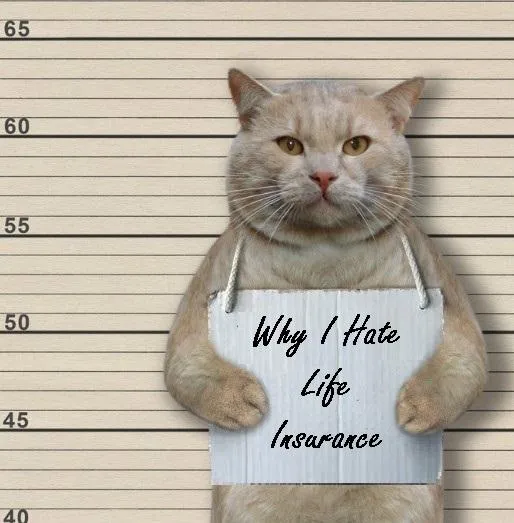December's Featured Article
Why do people hate
life insurance?
People may hate life insurance for a number of reasons.
For instance, when individuals buy a policy without reading the fine print, their beneficiaries could be in for a surprise.
Here are reasons some folks hate life insurance and how to avoid becoming one of them.

Top reasons people hate life insurance
You can’t get it when you want it.
It seems too expensive when you don’t need it.
Understanding how different policies work can be difficult.
Depending on the wrong coverage leads can lead to losing a lot of money.
Processing a death claim can be complicated.
Policies cancel or expire abruptly.
Coverage doesn’t pay out as expected.
Let’s break each one of these down to make sure you don’t end up hating your life insurance.
You can’t get it when you want it
Most people don’t really start thinking about the benefits of life insurance until they get older. They say with age comes wisdom, but they don’t tell you about the reduced mobility and health problems. Sure, you’ve noticed your own grandparents start to slow down. You probably remember hearing your parents start to make noises when they got up off of the couch.
Everyone’s talking about the importance of diet and exercise while many of them continue to eat fast food regularly. With the high levels of salt, sugar and other lab made chemicals that exist in today’s processed food, it’s no surprise that heart disease, stroke and cancer are the top silent assassins in this country. Many of us Americans are eating our way into an early grave.
So it’s not often until that uncomfortable conversation with a medical professional that we start to pay special attention to the way we treat our bodies. Now that a diagnosis has been made and a script for pills has been entered into the system, you have a health condition listed on your “permanent record” and it’s not good. Now all the insurance companies can see it.
So you may be left in a situation where you may desperately need life insurance to pay off your house, settle other debts and provide cash for a funeral and other final expenses. But you waited too long, and the insurance companies have denied you the coverage you requested.
What do you do now? Your other choices are to prepay everything now and eliminate debts, but now you’re sick. Are you still able to work and generate enough of an income to survive? Do you also have the responsibility of providing for a spouse and other family members?
All this added stress isn’t helping you get better. Not only is it possible to course correct despite existing health issues, it also may be possible to get the life insurance you need. Click here to learn how you could still get covered today even though you think your health may be an obstacle.
It seems too expensive when you don’t need it
Imagine your body as a machine.
A vehicle.
It has many different interconnected parts.

If you drive a motor vehicle, you know you won’t get too far down the road without a good set of tires, brakes and rotors. There may be days that you look at your balding tire and figure, at least the other tires are decent, right? You may have turned up the radio to drown out squeaky brakes.
Then you notice the inspection sticker is up at the end of the month. You go and sit in the waiting room, and your mechanic tells you that you’ll need to replace everything right now in order to pass inspection. You already know how expensive all those items are. Being handed that bill while you may be struggling with the car note, auto insurance and gasoline prices is painful.
To make matters worse, you have to sign up for the store credit card just to get it all done today. You’ve filled out all of the paperwork and now you’re waiting for the approval. The clock on the wall begins to tick so loud that you didn’t even hear them call your name. Back up to the counter.
Behind the counter, the office manager looks over at you, disappointed. Your application for credit has been denied. Now you can’t help but think of all the times earlier that year that you saw the signs for tire sales. You even got an offer in the mail for discount brakes last month!
But it wasn’t until you were told by a professional and forced to comply with state law that you realized the error of your ways. Will this experience cause you to handle things differently?
Many of us treat our health and finances the same way. Sometimes, we allow ourselves to “squeak” by, ignoring the obvious signs of pending doom. For the same reasons, we may delay applying for the coverage we will need in the future. Click here to learn about the most affordable highest valued options available for life insurance at any age with specially priced programs.
Understanding how different policies work can be difficult

For most people,
reading technical descriptions of
financial products can feel mind-numbing.
Unless there’s a burning desire to learn, stumbling across jargon-filled manuscripts is not only challenging but can also lead to feelings of discouragement. If reading an article that causes you to start looking up definitions, it’s easy to get distracted. Or even just give up.
Oftentimes, descriptions of life insurance products can be over-complicated, over-simplified, inaccurate or may even seem misleading. There is an army of under-educated agents peddling policies they don’t completely understand. These agents are pushing products based on sales training rather than product training. Their agency managers are doing the public a disservice.
Insurance is an institution that has been around for centuries. It originated for merchants who were sending goods far distances to ensure that they didn’t lose everything to a chance encounter with thieves, bad storms or other extreme natural disasters. The first individual insurance policy was written over 500 years ago, so the underlying product is part of a proven system of finance.
Since there is an unfortunate and overall lack of financial education in this country. Most people shy away from the subject of money simply because it was not talked about at home. Naturally, it may feel like a difficult subject. Click here to access an article that gives an in-depth overview of the most popular forms of life insurance available with language that is simple and clear.
Depending on the wrong coverage leads can lead to losing a lot of money
When we make assumptions that turn out to be wrong, it’s normal to reflect on what just a little bit of digging could have uncovered.
That’s why they say hind-sight is twenty-twenty.
It always seems so easy to find the answers to questions after we’ve already taken action.

Unfortunately, that kind of trial by error could end up costing you big time!
For instance, most working people depend on the benefits provided to them by their employer. How else could we manage being great at our jobs and have the time to research, understand and afford all of our various types of insurance to cover our most important needs. Whether it’s taking the kids to the doctor, getting an annual check up, or checking off the coverage checklist “I have life insurance” box, we tend to expect our employee benefit package to cover our needs.
So what happens when people get sick and can no longer work. First, they apply for COBRA provided through the “The Consolidated Omnibus Budget Reconciliation Act” which allows laid off employees to continue to access their current health care coverage for a short time after their employment ends amicably. This provision exists to ensure you are covered until your next job.
But what happens if you physically cannot return to work and are not able to find other gainful employment? More specifically, what happens to your life insurance benefits?
When a person leaves their employer for whatever reason including retirement, their benefits as an employee expire. They simply cease to exist. It doesn’t matter whether you paid an additional contribution towards the coverage or if it was “free” to join the group’s plan.
In fact, if you attempt to get your hands on a copy of the policy you have from work, you’ll find that all you will ever be given is a “certificate” of insurance. This is because your employer owns the policy and you are covered under their plan. Employers typically renew this coverage annually.
So if you know anyone who has happened to leave work because of an illness and could not return to any gainful employment, only are they not covered by any employer provided insurance. Most likely they can no longer qualify to purchase individual insurance either.
Most people don’t realize this, but life insurance is not actually something you can just buy. Each individual that intends to purchase coverage has to “apply” first. The insurance companies run a search that confirms the health information provided on the application. If pre-existing conditions are found, the applicant may end up being “rated”, being offered a “graded” policy or be “denied”.
In the event that you are facing health challenges and currently attempting to secure coverage, there is a better way to find a company that will treat you favorably rather than filling out any junk mail letters or scouring the search engines for answers. Click here for a simple solution that allows you to complete one application and collect as many quotes as you want at one time.
Processing a death claims can be complicated
Death is straightforward and final. Understanding how or why a person died may not be.
Specifically, determining the cause of death can be a thing of mystery, but oftentimes it comes down to a science. When the information on an application does not match the proven cause of death, the insurance companies have to protect themselves from overpaying claims.
A common problem caused by new agents is when they try to entice a prospective client to take a policy based on false information. It’s common knowledge that tobacco users pay higher rates than non-tobacco insureds. Regularly, new agents submit applications with false or inaccurate information. At first, everything seemed great. The applicant thinks they got a great deal.
Months or years later, after faithfully paying into their new low rate life insurance policy, the applicant dies. This is when all hell breaks loose. The policy holder’s beneficiary, or family member in charge, submits the claim and the insurance company confirms the cause of death.
Imagine if you were the insurance company, you issued a policy for a non-smoker, then that individual dies of mouth, esophagus or lung cancer. Would you want to pay out that claim?
While life insurance companies may manage large amounts of money, part of staying in business is not over paying claims. In order to stay solvent, many insurers charge 20% to 40% higher premiums for smokers because they tend to die much earlier than non-smokers, so if they were to pay out hundreds or thousands of claims based on inaccurate applications, they would eventually go out of business. Click here to learn more about special rates for smokers.
For this same reason, you will want to make sure the information on your application for life insurance is complete and accurate. Do not trust or encourage any agent that suggests they can complete an application with less than 100% honesty. The claims filed may not be paid.
Policies cancel or expire abruptly
Some types of life insurance will only ever pay out 1% of the time.

That means out of 100 paying policy holders, 99 of them would be better off using their dollars as kindling than giving it to the insurance company.
This sounds like a predicament to be in, so let’s take a deeper dive.
(See below to learn about policies that are designed to pay out 100% of the time.)
The reason so many policies end up canceling is that they began with unrealistic expectations.
First, the odds may be stacked against the policy owner or the insured person. After taking a closer look at your policy, you may realize that after a certain period of time, the low premiums you are paying now are set to skyrocket in the future. Premiums could increase anywhere from 10 to 15 times higher in the near future, and continue to rise every year after that.
Second, the policy may have been issued with a predetermined expiration date. If you see that your policy is set to expire after being in force for 10, 15 or 20 years, there is a statistically high probability that you will outlive that covered. If you die early, it’s possible that your policy pays out as expected, however, the claim will be subject to the same stringent claim processing outlined above. Click here to learn how to convert your existing policy to a permanent plan.
Third, it is becoming more of a well known fact that companies that advertise on television tend to begin the policies they offer with a two to three year “waiting” period. This “grading” or “capitalization” time affords the company the ability to take on higher risk clientele and not run out of money paying short term claims. Click here to learn how to avoid long “grading” periods, even if you’ve been diagnosed with heart, lung, liver or kidney problems or other health challenges.
Finally, if a person covered by a life insurance dies suddenly and their bank account is frozen, their final payment may not be processed and could cause the policy to lapse before their claim is reported. Most insurance policies come with a 30 day grace period, meaning the policy will continue with one late payment until that payment can be caught up. Click here to learn how to qualify for a policy that is designed to stay in-force without payments for longer than 30 days.
Do your own due diligence. When you receive any life insurance policy, read it with a pencil and highlighter by your side. Highlight any language that is unclear or confusing. Call and question your agent or contact the home office to clarify everything. You generally have the first 10 to 30 days (depending on the company) to review your documents and decide to accept the terms.
Coverage doesn’t pay out as expected
All too often, life insurance doesn’t pay out the way people expect.
The most common reason for this is that the policy owner, the insured or the payor never read it.

If you have individually owned life insurance, you may hold all three titles mentioned above. That makes it imperative for you to read your own policy as soon as it arrives in the mail. Even when you are working with a seasoned, well respected agent that you know you can trust, it is imperative for you to read through the policy at least one time. It will tell you everything about it.
Insurance companies must provide clear, easy to read and simple to understand explanations of how their policies work because they are considered to be “unilateral”, meaning that the company offering coverage makes a promise in writing of exactly what your loved ones can expect in the end. When you are no longer here, all that matters is the language in the policy.
There are certain types of life insurance plans that are guaranteed to pay out 100% of the time. They make their promises simple and clear to understand. They set reasonable expectations and make it easy for beneficiaries to collect death claims. However, these are not typically provided by the companies that spend millions of dollars a month on television advertisements.
Click here to learn how to sift through 100s of companies at once to find the “best deal” available.
This article was written by Bruce Colwell, a National Broker with over a decade of experience working with finance.

Bruce teaches professionals how to keep more profit, pay themselves 1st & live their dream lifestyle. When he’s not problem solving for clients, he’s usually out in the back yard grilling up something tasty, exploring scenic America with his wife or relaxing in their hot tub enjoying a good book.
This career chose me.
Now I teach others.
Unfortunately, my Father passed away over a decade ago which was way before his time. Even in death, he thought of his family first and fulfilled his goals: paying off our family homestead, settling all of his debts including vehicles and credits cards. He even left behind enough to take care of his final expenses. He is my inspiration for serving your family now.
We Thank God everyday that he was prepared for the worst. Dad lived his life to the fullest, as if every day was his last. I didn't realize it at the time, but he taught me how to plan for the worst, even if it seems unnecessary.
There's not a day that goes by that I don't think of my Father fondly. How completely selfless his decision was to protect my Mother from losing everything; the house, the cars, etc. Everything was taken care of.
We know without question that he loved us more than we could have known at the time. Families you know will be torn apart this year by heart attack, cancer, stroke, overdose, diabetes, or other health issues.
For whomever you love most,
don't wait until it's too late.
Your Agent for Life!

Young or old, death doesn't discriminate...
Actors, Directors, Athletes, Presidents & Heads of State
who
died
suddenly.
Luke Perry
Cary Grant
Bill Paxton
Debbie Reynolds
Della Reese
Grace Kelly
John Singleton
Kirby Puckett
Franklin Roosevelt
Richard Nixon
Gerald Ford
Warren G. Harding
Ulysses S. Grant
Grover Cleveland
Theodore Roosevelt
Winston Churchill
Stokes, Brain Aneurysms & other fatal health conditions happen to unsuspecting Americans every day without any symptoms or warning!
This career chose me.
Now I teach others.
Unfortunately, my Father passed away over a decade ago which was way before his time. Even in death, he thought of his family first and fulfilled his goals: paying off our family homestead, settling all of his debts including vehicles and credits cards. He even left behind enough to take care of his final expenses. He is my inspiration for serving your family now.
We Thank God everyday that he was prepared for the worst. Dad lived his life to the fullest, as if every day was his last. I didn't realize it at the time, but he taught me how to plan for the worst, even if it seems unnecessary.
There's not a day that goes by that I don't think of my Father fondly. How completely selfless his decision was to protect my Mother from losing everything; the house, the cars, etc. Everything was taken care of.
We know without question that he loved us more than we could have known at the time. Families you know will be torn apart this year by heart attack, cancer, stroke, overdose, diabetes, or other health issues.
For whomever you love most,
don't wait until it's too late.
Your Agent for Life!

Young or old, death doesn't discriminate...
Actors, Directors, Athletes, Presidents & Heads of State...
who
died
suddenly.
Luke Perry
Cary Grant
Bill Paxton
Debbie Reynolds
Della Reese
Grace Kelly
John Singleton
Kirby Puckett
Franklin Roosevelt
Richard Nixon
Gerald Ford
Warren G. Harding
Ulysses S. Grant
Grover Cleveland
Theodore Roosevelt
Winston Churchill
Stokes, Brain Aneurysms & other fatal health conditions happen to unsuspecting Americans every day without any symptoms or warning!
This site is not a part of Facebook website or Facebook Inc.
Additionally, this site is NOT endorsed by Facebook in any way.
FACEBOOK is a trademark of FACEBOOK INC.
This site is not a part of Facebook website or Facebook Inc.
Additionally, this site is NOT endorsed by Facebook in any way. FACEBOOK is a trademark of FACEBOOK INC.








